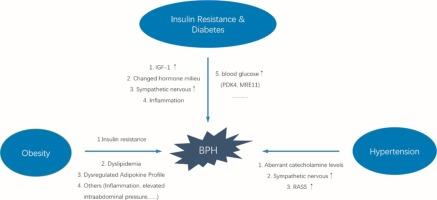代谢综合征与良性前列腺增生之间的关系:潜在的分子联系。
IF 5.2
2区 医学
Q1 MEDICINE, RESEARCH & EXPERIMENTAL
引用次数: 0
摘要
良性前列腺增生症(BPH)是导致下尿路症状(LUTS)的常见病因,最近已被视为一种代谢性疾病。代谢综合征(MetS)是包括胰岛素抵抗、肥胖、高血压和血脂异常在内的一系列代谢紊乱,已证实代谢综合征的这些组成部分是加重良性前列腺增生患者前列腺增大和膀胱出口梗阻程度的重要因素。临床和实验研究表明,胰岛素、胰岛素样生长因子 1(IGF-1)、雄激素和雌激素、脂肪因子等多种分子参与了前列腺增生症和 MetS 的重叠发病机制,这表明临床医生可以通过选择适当的药物同时缓解或治愈两种疾病。本文旨在系统回顾良性前列腺增生症的病理生理、传统病因和发病机制,并从分子角度探讨 MetS 与良性前列腺增生症之间错综复杂的关联,以期为更好地治疗两种疾病提供更有力的证据。本文章由计算机程序翻译,如有差异,请以英文原文为准。

Association between metabolic syndrome and benign prostatic hyperplasia: The underlying molecular connection
Benign prostatic hyperplasia (BPH), a common cause of lower urinary tract symptoms (LUTS), has been recently regarded as a metabolic disease. Metabolic syndrome (MetS) is a constellation of metabolic disarrangements, including insulin resistance, obesity, hypertension, and dyslipidemia, and it has been established that these components of MetS are important contributing factors exacerbating the degree of prostatic enlargement and bladder outlet obstruction among patients with BPH. Clinical and experimental studies demonstrated that many molecules, such as insulin, insulin-like growth factor 1 (IGF-1), androgen and estrogen, and adipokines, are involved in the overlapping pathogenesis of BPH and MetS, indicating that clinicians might be able to simultaneously alleviate or cure two diseases by choosing appropriate medications. This article aims to systematically review the pathophysiological aspect and traditional etiology and pathogenesis of BPH and discuss the intricate association between MetS and BPH from the molecular point of view, in an attempt to provide stronger evidence for better treatment of two diseases.
求助全文
通过发布文献求助,成功后即可免费获取论文全文。
去求助
来源期刊

Life sciences
医学-药学
CiteScore
12.20
自引率
1.60%
发文量
841
审稿时长
6 months
期刊介绍:
Life Sciences is an international journal publishing articles that emphasize the molecular, cellular, and functional basis of therapy. The journal emphasizes the understanding of mechanism that is relevant to all aspects of human disease and translation to patients. All articles are rigorously reviewed.
The Journal favors publication of full-length papers where modern scientific technologies are used to explain molecular, cellular and physiological mechanisms. Articles that merely report observations are rarely accepted. Recommendations from the Declaration of Helsinki or NIH guidelines for care and use of laboratory animals must be adhered to. Articles should be written at a level accessible to readers who are non-specialists in the topic of the article themselves, but who are interested in the research. The Journal welcomes reviews on topics of wide interest to investigators in the life sciences. We particularly encourage submission of brief, focused reviews containing high-quality artwork and require the use of mechanistic summary diagrams.
 求助内容:
求助内容: 应助结果提醒方式:
应助结果提醒方式:


